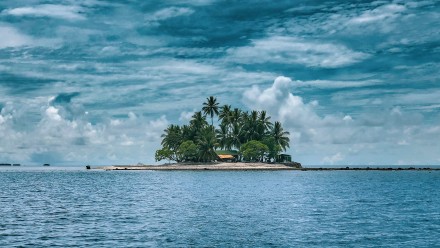IPCC Sixth Assessment Report: An overview of Impacts, Adaptation and Vulnerability for the Pacific
In February 2022, the Intergovernmental Panel on Climate Change (IPCC) will release its new Working Group II report which assesses the impacts, adaptation and vulnerabilities related to climate change. This report assesses the impacts of climate change from a world-wide to a regional view of ecosystems and biodiversity, and of humans and their diverse societies, cultures, and settlements. It considers their vulnerabilities and the capacities and limits of these natural and human systems to adapt to climate change and thereby reduce climate-associated risks, together with options for creating a sustainable future for all through an equitable and integrated approach to mitigation and adaptation efforts at all scales. IPCC reports are the world’s most authoritative sources of climate science, approved by 195 countries.
The Pacific Climate Change Centre hosted by SPREP in partnership with the Institute for Climate, Energy & Disaster Solutions at the Australian National University will be hosting the Intergovernmental Panel on Climate Change Sixth Assessment Report: An Overview of the Impacts, Adaptation and Vulnerability for the Pacific. This webinar will discuss the main findings of the report and its implications for the Pacific.
Professor Mark Howden is a Vice Chair of the IPCC and has made major contributions to this report. He will share insights on key findings while also participating in a panel discussion with Pacific experts, including a fellow IPCC author and representatives from Climate Analytics and SPREP. This panel discussion will be moderated by the Pacific Climate Change Centre.
PRESENTATION SLIDES (PDF, 2.8 MB)
Program
- Introduction and opening remarks
- Presentation from Professor Mark Howden
- Introductions from Panelists
- Questions and Answers session
- Closing remarks
Moderated by Ms. 'Ofa Kaisamy, Manager, Pacific Climate Change Centre
About the Speakers
Professor Mark Howden - Vice-Chair of the Intergovernmental Panel on Climate Change (IPCC) and the Director of the Institute for Climate, Energy & Disaster Solutions at The Australian National University.
Prof Howden is an Honorary Professor at Melbourne University, a Vice Chair of the Intergovernmental Panel on Climate Change (IPCC) and is the Chair of the ACT Climate Change Council. Mark has worked on Climate Change issues over 30 years. Issues he has addressed include agriculture and food security, the natural resource base, ecosystems and biodiversity, energy, water and urban systems.
Mark has over 420 publications of different types. He helped develop both the national and international greenhouse gas inventories that are a fundamental part of the Paris Agreement and has assessed sustainable ways to reduce emissions. He has been a major contributor to the IPCC since 1991, with roles in the Second, Third, Fourth, Fifth and now Sixth Assessment Reports, sharing the 2007 Nobel Peace Prize with other IPCC participants and Al Gore.
Dr. Luteru Tauvale – Assistant CEO – Meteorology Division, Ministry of Natural Resources and Environment (MNRE, Samoa)
Dr Luteru has worked in the Meteorology field for over 15 years in Samoa and he is an author of IPCC WG1. He graduated with a Doctor of Science in Meteorology (PhD) from Nagoya University in Japan. He is one of the most senior Pacific Meteorology scientists in the Samoa and he has extensive experience in meteorology, climate science and climate change and contributed to pacific scientific articles and publications.
Mr. Jonah Auka - Manager, Adaptation and Projects, Climate Change and Development Authority (Papua New Guinea)
Mr Auka has been a climate change adaptation practitioner both in policy and practice. For the last 7 years he has been engaged with PNG’s International Negotiations Team to the UNFCCC since the signing of the Paris Agreement in 2015. He has worked in the UN Headquarters in New York under the Executive Office of the Secretary General in 2019 as a Program Officer facilitating and coordinating the 2019 Climate Action Summit that was hosted by the UN Secretary General Antonio Guterres. He is also the PSIDS coordinator on Adaptation. Mr Auka volunteered to take up the role in Glasgow at COP 26.
Ms Filomena Nelson – Climate Change Adaptation Adviser, Climate Change Resilience, SPREP
Ms Nelson has more than 20 years of work experience in various roles in leading and coordinating the development of mechanisms to strengthen disaster, adaptation and climate resilience in the Pacific. Much of this work involves governance and policy reviews as well as enhancing operational arrangements for the efficient and effective coordination of disaster risk management (DRM) in Samoa, the bulk of the work includes capacity building and training with various stakeholders and facilitating communication and knowledge management trainings across climate thematic areas for pacific island countries.
Ms Yvette Kerslake – Technical Advisor – Science to Services, Pacific Climate Change Centre
Ms Kerslake has more than 10 years of work experience in Environment and Climate Change at senior level as Assistant Resident Representative/Programme Manager – Environment, Energy and Climate Change for UNDP, Integration of Climate Change into the Forestry Sector project Manager/Coordinator & Principal Watershed Officer for the Ministry of Natural Resources and Environment in Samoa. Through her experience she has managed a variety of research based, evidence driven projects throughout pacific island countries.
About the moderator
Ms Ofa Kaisamy – Manager, Pacific Climate Change Centre (PCCC).
Ofa has more than 10 years’ experience in legal and analytical work (institutional analysis, capacity needs assessment, SWOT analysis, policy development, socio-economic assessments and surveys, stakeholder analysis and engagement.)
More than 10 years’ experience in programme/project development having worked for the Deutsche Gesellschaft für Internationale Zusammenarbeit (GIZ) CCCPIR, Australian Aid (AusAid) ICCAI Program, Global Environment Facility (GEF) SPREP ABS Project and the Government of Tonga with consolidated experience in capacity building, communication and facilitating training across environment and climate change.









